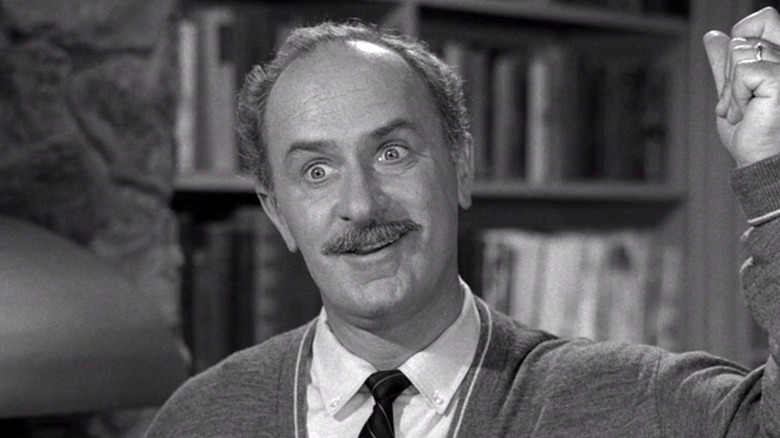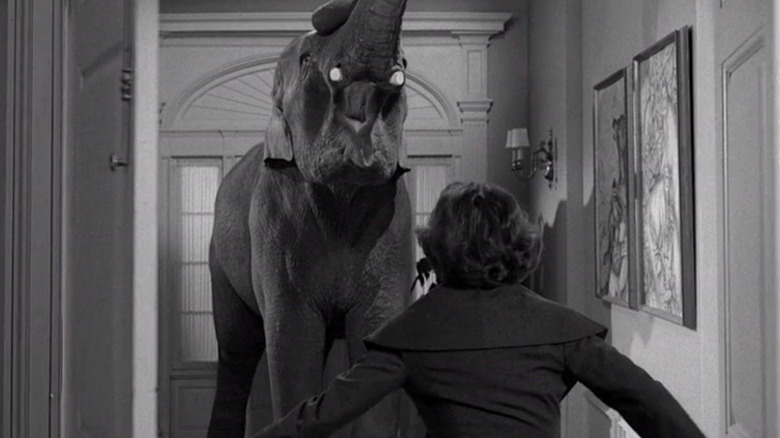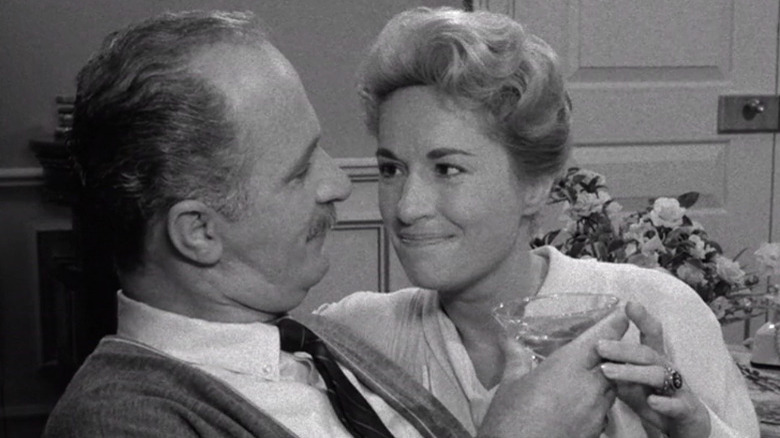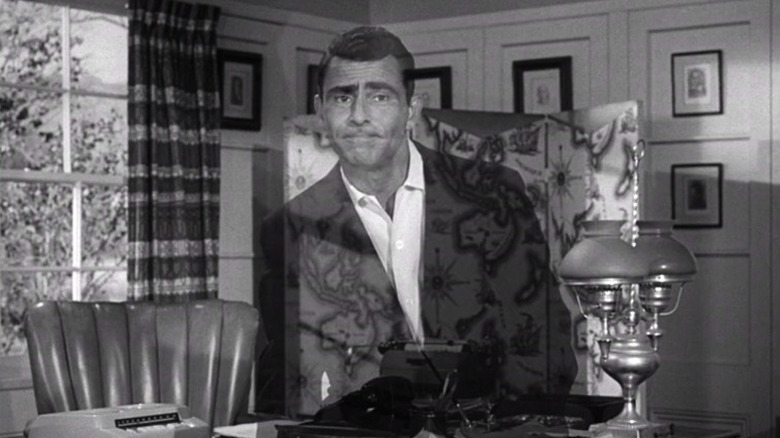This Was The Twilight Zone Episode Where They Killed Rod Serling
As an anthology television series, with new stories and new characters every single week, "The Twilight Zone" never had someone you could call a "main character." Audiences tuned in every week to see Jessica Fletcher catch killers on "Murder, She Wrote," and for Larry David to be a massive a-hole on "Curb Your Enthusiasm," but there was no single star in "The Twilight Zone."
There was, however, one person who appeared throughout the whole series, in pretty much every episode, if only briefly. His name was Rod Serling. He was already one of the most celebrated TV writers in the world when he created "The Twilight Zone," thanks to hard-hitting dramas like "Patterns" and "The Comedian," and his name was probably not unknown to many fans of televised programs when the series premiered. Over the course of "The Twilight Zone," he would introduce new episodes, tease upcoming stories, and generally loom over the proceedings like a godlike master of ceremonies.
Was he the show's creator, consistently breaking the fourth wall? Was he a more mysterious figure, an all-knowing entity sharing his knowledge of the so-called "Twilight Zone?" Serling's role wasn't always well-defined, but it was effectively a combination of both. He was a master of ceremonies, and yet he, himself, lived in the universe of these stories, often appearing around corners or outside windows, commenting on the weird events of the series as they happened.
Since Rod Serling's narrator lived within "The Twilight Zone," that also made him vulnerable to its dangers. In the final episode of the show's first season, one of the characters even kills him.
'A World of His Own'
The first-season finale of "The Twilight Zone" is one of its funnier episodes, and also one of its most self-contained. It's set entirely within the living room of Gregory West, a playwright played by the incredibly prolific character actor Keenan Wynn (who previously co-starred in the award-winning TV movie "Requiem for a Heavyweight," also written by Serling). At the beginning of the episode, a woman named Mary (Mary LaRoche, "Gidget") makes Gregory a martini, which he says is "perfect." And she says, "Are you describing yourself, Mr. West?"
Everything in Mr. West's life is just wonderful ... until his wife comes home. Having seen her husband and Mary through the window, Victoria (Phyllis Kirk, "House of Wax") starts snooping around, but Mary has disappeared. After needling Gregory, he admits his secret: As a writer, he has the power to create characters so fully realized they come to life on their own. All he has to do is describe them on his audio recorder. When he needs them to disappear, he cuts out the magnetic tape their description was recorded on, throws it in the fire, and poof.
Victoria doesn't believe him, but he describes Mary once again and she appears. Disturbingly, Mary knows she's been erased many times to keep this secret from his wife, and she hates it, and hopes she's never summoned again. Victoria still doesn't believe it and storms out, ready to have Gregory committed, but he summons an elephant in their living room to stop her.
In the end, Gregory realizes that Victoria is too strong-willed to love him, and he reveals that he wrote her wrong. He pulls out an envelope with Victoria's name on it, and almost sets it on fire, but stops himself. So she throws it in, accidentally erasing herself from existence, leaving Gregory to finally have the life he really wants with Mary.
Nobody likes a critic
Written by Richard Matheson, "A World of His Own" was originally conceived as a much darker story, according to Marc Scott Zicree's "The Twilight Zone Companion." Even as a comedy it's got a vicious streak. It's the tale of women with no agency of their own, and when one of them develops too much individuality, and finds a way to defy her creator/husband, she's deleted from existence. And just when he's about to bring her back he realizes he doesn't want to, and doesn't have to, and instead resurrects a woman who just minutes ago said she hoped he would never create her again. It may be a "funny" story, but it's not a happy one.
What's more, Rod Serling himself doesn't seem to care for it. At the end of the episode Serling appears, as he often does, within the world of the film, telling the audience about the events they witnessed. In "A World of His Own," he also editorializes and refers to the tale as "ridiculous nonsense," at which point Gregory West gets offended. Unlike the other "Twilight Zone" residents he can actually hear Rod Serling, and we quickly find out why: Gregory West created him. He pulls out an envelope marked "Rod Serling" and throws it in the fire, and Rod Serling says, "Well ... that's the way it goes," and vanishes into nothingness.
Rod's not dead
The decision to kill Rod Serling in the season finale of "The Twilight Zone" came before the show had been picked up for a second season, and could realistically have been the conclusion of the whole series. It's a poetic notion, that a show made by writers bringing fantastic notions to life would, in the end, bring to life another writer who brought fantastic notions to life. And that writer would rewrite the show's head writer, and effectively kill him. The mind boggles.
For his part, screenwriter Richard Matheson thought this was all in good fun. "I think I was the only one who ever was able to add a sequence where Rod Serling was made to disappear, too. It was the last show of the season, so they felt they could do that," he later said in "The Twilight Zone Companion."
Rod Serling would, of course, return to "The Twilight Zone," and after the first season would appear on-screen more often than he did in the first run of episodes. How nice of Gregory West to write him back into existence. Now if he could only do something about that kid in Peaksville who keeps wishing people into the cornfield...



